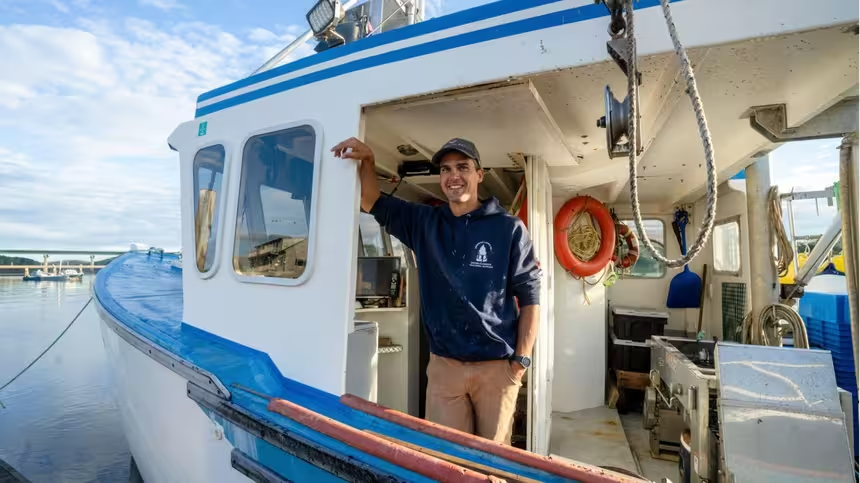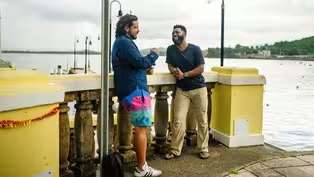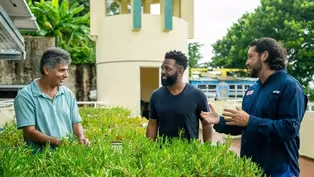
Baratunde Thurston Goes Squid Fishing
Clip: Episode 1 | 8m 38sVideo has Closed Captions
Baratunde joins Rodolfo and Raimundo as they hunt for deepwater diamondback squid.
Baratunde Thurston joins Raimundo Espinoza, Founder and Executive Director of Conservación ConCiencia, and a local fisherman, Rodolfo Abrams, as they hunt for diamondback squid in Puerto Rico. However, their day at sea is quickly cut short as the three men are suddenly surrounded by ominous, torrential downpour – and must head back to land quickly to escape the storm.
Problems playing video? | Closed Captioning Feedback
Problems playing video? | Closed Captioning Feedback

Baratunde Thurston Goes Squid Fishing
Clip: Episode 1 | 8m 38sVideo has Closed Captions
Baratunde Thurston joins Raimundo Espinoza, Founder and Executive Director of Conservación ConCiencia, and a local fisherman, Rodolfo Abrams, as they hunt for diamondback squid in Puerto Rico. However, their day at sea is quickly cut short as the three men are suddenly surrounded by ominous, torrential downpour – and must head back to land quickly to escape the storm.
Problems playing video? | Closed Captioning Feedback
How to Watch Hope in the Water
Hope in the Water is available to stream on pbs.org and the free PBS App, available on iPhone, Apple TV, Android TV, Android smartphones, Amazon Fire TV, Amazon Fire Tablet, Roku, Samsung Smart TV, and Vizio.
Buy Now

What is Aquaculture?
The new three-part series “Hope in the Water” explores the groundbreaking work of dedicated fishers, aqua farmers, and scientists who are attempting what was once thought impossible: harvesting aquatic species to feed our growing planet while saving our oceans.Providing Support for PBS.org
Learn Moreabout PBS online sponsorship♪ - [Baratunde] Overfishing of oceans has tripled in the last half century, decimating entire fisheries, the areas of the ocean where certain species would otherwise flourish.
While the problems of large scale industrial fishing grab headlines, a lot of wild fishing happens at the local level.
- Small scale fishing is the food basket of 2 billion people.
There are about 4.6 million fishing boats out there, and 98 percent of those are actual small scale boats.
They catch fish for their daily sustenance, they catch fish as part of their jobs, livelihoods, but also as part of a culture.
- I always wanted to start my own non-profit that worked in civil society.
Studied environmental studies at Pace University in New York and was really into the environment.
I'm the executive director for Conservación ConCiencia, it's a non-profit organization that works in environmental conservation here in Puerto Rico.
The fishing industry in Puerto Rico really depends on, on several species.
Mainly lobster, queen conch and deep water snappers.
We can't really separate protecting the environment from human society, we're part of it.
And so in order to be effective in protecting nature and having conservation, folks need to be able to make a living off of nature.
But at the same time, some of the resources have historically been overfished and fisheries have declined a bit.
And so that really took us to identifying the need that we need to work with the fishery sector to see how we can continue to diversify their catch so that they can still provide for their families.
(people speaking Spanish) - Success.
(gentle music) [Speaking foreign language] - Part of the reason why we can continue to ensure that this is sustainable is because of the scale that we're doing it.
We're not going out there with massive industrial boats fishing everything that we can.
All right, ready.
- Beautiful calm day so far.
- We're going out there in small scale with local artisanal fishers.
We go out through San Juan Bay and after about two or three miles, the sea floor starts to get really deep.
800 feet... 900 feet... 1,100 feet... 1,600, 1,700 feet.
That is deep.
And once we're in that deep, Rodolfo is putting bait on these jigs, these specially designed, very aggressive hooks.
- This is glow in the dark.
So this glow in the dark while it's bouncing up down the water.
This is the light.
- Yeah, eat me, eat me.
- Squids are like oh!
- No lights, no bite.
- No lights, no bites.
- Exactly.
- They drop them into the water on the line and they lower this line.
- So when the line ends, we hook it up to the buoy.
We repeat that process four or five times.
We're gonna drop the next one.
- All right.
Please squid, please.
Is there a special dance we should do for the squid?
- Bachata?
- Yeah, heard squid like bachata.
- Under normal circumstances, what occurs is that squids are very aggressive predators.
So when they see those lights, they'll shoot at it and when they grab it, they'll get hooked on.
And you bring it on board.
And that's a normal day's work.
But when we went out with Baratunde, that's not what happened.
- Off in the distance after we've dropped these buoys, you could see dark storm clouds, they were almost cartoonish in how nearly black they were, but they were way out there.
- We could see on the radar that is still in Luquillo, which is about an hour away from San Juan.
- So is it coming toward us or is it going along the island?
- If that starts moving, we might have to go back.
- Oh, okay.
- Because it's big.
- We started putting the fourth line out, but then we started to see it continue to come closer, and I was like, that does not look an hour away, it looks right on us.
And Rodolfo, he looks at me and he tells me, we're gonna have to pull up.
So once it starts to pull up, takes about five or six minutes of the electric wheel going.
(dramatic music) - And then suddenly, the storm was on us.
(dramatic music) - In those five or six minutes, it had gotten very bad.
The rain and the wind have picked up a lot.
- And at this point, I'm thinking this is serious.
Like I'm calling on my physical strength and my own mental fortitude and just trying to stay calm in the face of troubled waters.
- Thankfully, Rodolfo knows what he is doing.
But it was one of those situations that that's actually, that's part of a very risky livelihood that is fishing.
- Rough day, rough day at the office.
(gentle music) [Speaking foreign language] - We're trying to tell the real story of these people and part of the real story is that it's dangerous.
That it is hard and all of that fear and all of that physical stress and all of that anxiety is part of the cost of the food we eat.
And that's not something I'm used to thinking about in the grocery store aisle.
- The reality of it is that when you go out at sea, anything can happen.
You can die in a collision with a big boat, bad weather, the other thing running out of fuel, your gear breaks.
The local fishery is the one that brings you sustainable food to your plate.
And you have to appreciate their effort because every single time they go out at sea, they risk their life.
[Speaking foreign language]
Video has Closed Captions
Preview: Ep1 | 30s | New approaches to fishing on the open ocean aim to turn peril into plenty. (30s)
Puerto Rico’s Resilience in the Wake of Hurricane Maria
Video has Closed Captions
Clip: Ep1 | 7m 23s | How Puerto Rico’s Deepwater Squid Fishery got its start in the wake of Hurricane Maria. (7m 23s)
Providing Support for PBS.org
Learn Moreabout PBS online sponsorship
- Science and Nature

Explore scientific discoveries on television's most acclaimed science documentary series.

- Science and Nature

Capturing the splendor of the natural world, from the African plains to the Antarctic ice.












Support for PBS provided by:

